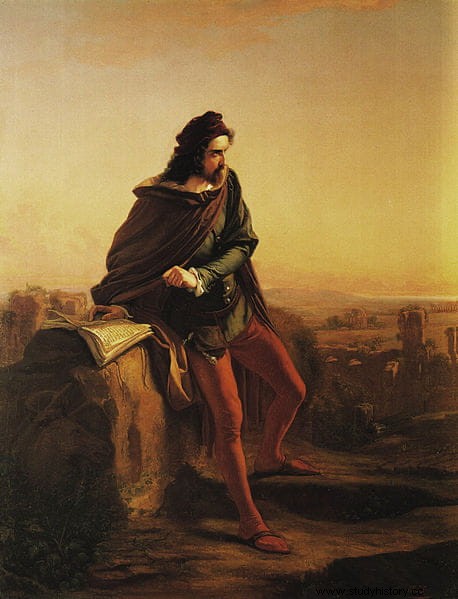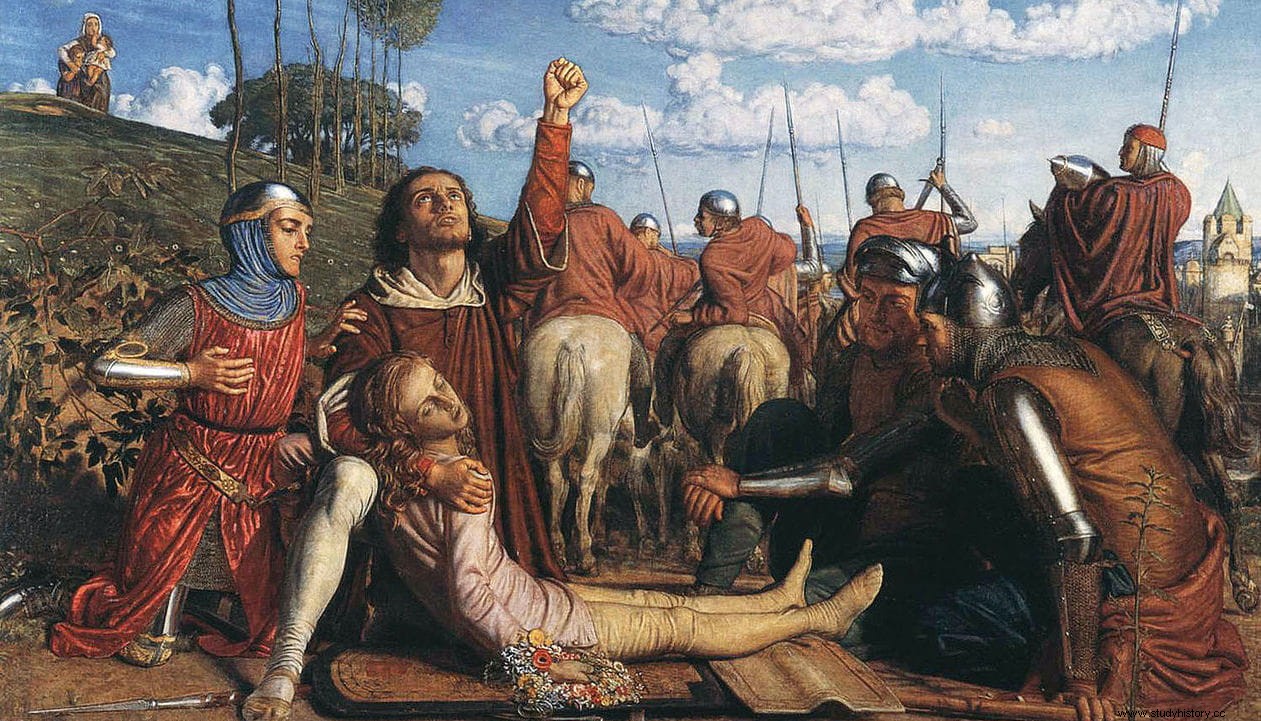Evidently, by the middle of the 14th century there was hardly anything left of Rome ancient, beyond a heap of ruins interspersed between late medieval buildings and some illustrious patrician families of those that are perpetuated in time. For not staying, even the Holy See had moved to Avignon , at that time not belonging to France but to Naples, when in 1309 Clement V decided to move away from the tense Roman environment (what was to be temporary lasted sixty-eight years and seven papacies, apart from those of the schism). But there were those who did not resign themselves to the fact that Rome was just the memory of a glorious past and wanted to recover its splendor:a son of the city called Nicola Gabrini, better known as Cola di Rienzo .
He was born in the Eternal City in 1313, from a poor family; His parents were a tavern keeper and a laundress. Although he claimed to be the bastard son of Henry VII, Holy Roman Emperor (the character Arrigo that Dante portrays in his Divine Comedy), the surname Rienzo derived from the name of his humble father, called Lorenzo, so perhaps the story of his imperial ancestry it was nothing more than a resource adopted later to have greater credibility.

Despite everything, Nicola received a good education and became a notary , position important enough to enter the service of Pope Clement VI in Avignon:Rome wanted the papacy to return to its traditional place and in 1343 sent a diplomatic delegation to persuade him, since in 1350 he played jubilee year. The pontiff was so satisfied with his work that he incorporated him into his court as a notary of the Apostolic Chamber , which was something like the Treasury of the Holy See. The position required residing in Rome and so, in 1344, Nicola returned to his birthplace, the same place he had harshly lashed with his accusations of corruption against the most prominent lineages (Colonna, Orsini…), whom he also considered guilty of the murder of his brother (he died in a fight between them). Consequently, this upstart notary was not well regarded in aristocratic circles.
But he didn't care because he played the people's card. In love with the classical authors, whom he had studied with enthusiasm, he set out to recover the splendor of the old days and turned to promoting numerous public works. Over the course of three years, a group of unconditional followers was forged, fed up with Stefano Colonna's manipulations, and on May 21, 1347, the appropriate moment arrived to give the blow of effect:after a series of disturbances, Rienzo, doing Using his powers, he summoned the people in front of the Capitol and made a stellar appearance , on horseback, dressed in armor and seconded by the papal vicar Raymond of Orvieto. The eloquent speech of him Promising changes, new legislation, administrative reforms and the banning of the aristocracy from municipal government, he raised a wave of enthusiasm such that it constituted a real seizure of power.
Indeed, the wealthy classes prudently chose to leave the city and in a matter of days Nicola di Rienzo was appointed Nicholaus, severus et clemens, libertatis, pacis justiciaeque tribunus, et sacrae Romanae Reipubliae liberator . That is, tribune , the position that in classical times had the mission of representing the common people before the magistracies dominated by the patricians, such as the Senate or the consuls, and that was chosen precisely in the so-called concilium plebis (a popular assembly). With the new manager, tranquility returned to Rome:Rienzo kept his promises , he put an end to the street disorder and limited the hitherto increasing crime, being unanimously applauded for his work and even receiving a letter of praise from Petrarch.
But his plan was more ambitious and that caused a conflict of interest. And it is that the new tribune aspired for Rome to regain power of yesteryear on the Italian peninsula, for which he asked all the cities to send a representative to the assembly, in order to establish a kind of federal republic where a relationship of Christian brotherhood prevailed. He would be the ruling head as dictator (or novus dux, in his own words) the old-fashioned way and, for this, he organized a somewhat grotesque ceremony , but loaded with symbolism, in which he bathed in the Lateran pool (the same one in which Constantine had done when he was baptized) and then went up to the Capitol to be crowned six times. You could almost say that he was trying to resurrect the Roman Empire.

Too much for the Pope, who saw threatened not only his authority but also the very sovereignty of the Papal States and, shortly, contacted the exiled clans to facilitate his return and conspire against the tribune . This one, as he had shown in the aforementioned ritual, had begun to fall into extravagance, behaving more like a tyrant than as a dictator by organizing frivolous parties and being forced to bleed the people with heavy taxes in order to put his projects into practice. So the same ones who had elevated him moved away from him progressively.
The first step was taken by Clement VI in 1347, by excommunicating Rienzo under the accusation of heresy and paganism. But, in parallel, the patrician families organized an army to try to depose him by force. The clash occurred in the battle of Porta San Lorenzo and ended in victory for the tribune, who obtained the help of Hungary. It was a double triumph because Stefano Colonna fell in person in the fight, but the cards were drawn and it was a matter of time before the overthrow came. Barely a month later, he himself abdicated and he withdrew from the city, taking refuge first in Naples and later in a community of Franciscan hermits on Mount Majella.
In 1350 he traveled to Prague to avail himself of the protection of Charles IV, whom he hoped to convince to march on Rome. Instead, the emperor imprisoned him and a year later he handed it over to the Pope at Avignon. Put on trial , he was sentenced to death but luck was on his side when the pontiff died in 1352 and Innocent VI was elected. , who also wanted to free himself from the power of the Roman clans. So Rienzo was pardoned, appointed senator and sent to the city at the head of a small mercenary troop, making a triumphal entry in 1354.
He had managed to regain absolute power but it didn't last a year. His policy was so clumsy , capricious and unpopular, with a state assassination included, that the same people who hailed his arrival months before took up arms and stormed his palace, lynching him and throwing his ashes into the Tiber. That heterodox and eccentric character would be vindicated centuries later, in the mid-19th century, wrapped in an aura of romanticism typical of the time, as a precursor to the Risorgimiento , of the confrontation with the papal authority and of the Italian unity; even Wagner dedicated one of his most celebrated operas to him, Rienzi, the Last Tribune .
